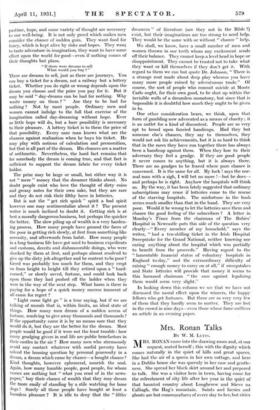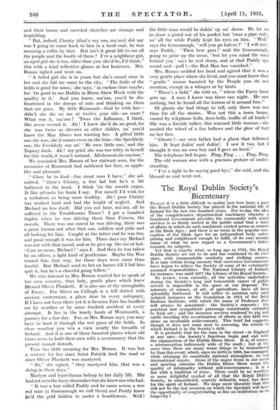Mrs. Ronan Talks
BY W. M. LErrs.
MRS. RONAN came into the drawing-room and, at our request, seated herself ; this with the dignity which comes naturally in the quiet of hills and great spaces. She had the air of a queen in her own cottage, and here in a Dublin house she was queenly in her ease and gentle- ness. She spread her black skirt around her and prepared to talk. She was a visitor here in town, having come for the refreshment of city life after her year in the quiet of that haunted country about Loughcrew and Slieve na Calliagh, the Hag's mountain. Saints and faeries and ghosts are but commonplaces of every day to her. but cities and their trams and crowded churches are strange and inspiriting.
" But, indeed, Christy (that's my son, ma'am) did say was I going to come back to him in a hard coat, he was meaning a coffin by that. But isn't it great life to see all the people and the bustle of them ? I've a neighbour girl, an aged girl she is too, older than you she'd be, I'd think," this with a kind reflective glance at her hostesses. Mrs. Ronan sighed and went on.
" A failed girl she is in years but she's sound sinse in her and she bid me come to the city. ' The frolic of the fields is good for some,' she says, ' in cuckoo time maybe, but 'tis good to see Dublin in Horse Show Week with the quality in it.' And you know, ma'am, you'd be dis- heartened in the dreeps of rain and thinking on them that are gone. My little Rosannah—God be with her— didn't she die on me at twelve year old—no more ? What was it, ma'am ? 'Twas the Influence, I think.
She never overed it. Ah ! I knew she'd do no good, for she was twice as cleverer as other childer, an' you'd know the Man Above was wanting her. A gifted little one she was, she'd names even on the hins—the Speckledy one, the Freckledy one an' Me own little one,' and the Topany duck. Ah ! my grief, she was too witty in herself for this world, it wasn't natural. All element she was too." We reminded Mrs. Ronan of her stalwart sons, for the memories of Rosannah had saddened her face, so apple- like and pleasant.
" Glory be to God—fine stout sons I have," she ad- mitted, " there's Christy, a fine lad but he's a bit bothered in the head. I think 'tis the mouth organ.
It like attracts his brain I say. For meself I'd wish for a melodeon as being more healthy. Ah ! poor Christy has worked hard and had the height of neglect. And Michael no less itself. Did you not hear, ma'am, all he suffered in the Troublesome Times ? I got a hundred frights when he was driving them Sinn Feiners, the rascals. There was one rascal he was driving, there was a great hurroo out after that one, soldiers and polis and all looking for him. Caught at the latter end he was too, and good enough it was for him. Three days my Michael was out with that rascal, and so he give up the car at last. Care no more, Michael ! ' says I. And then he was taken by an officer, a light kind of gentleman. Maybe the War turned him that way, for those days were more than fearful. But Michael used to bet on horses till I bid him quit it, but he's a cheerful going fellow."
We who listened to Mrs. Ronan wanted her to speak of her own country, that holy, gentle place which knew Blessed Oliver Plunkett. It is also one of the strongholds of Faery. For Slieve na Calliagh is a hill dotted with ancient souterrains, a place dear to every antiquary.
If I have not been there yet it is because Fate has baulked me by weather or by some freakish accident at every attempt. It lies in the lonely lands of Westmeath, a journey for a fine day. For, as Mrs. Ronan says, you may have to boot it through the wet grass of the fields. In clear weather you win a view nearly the breadth of Ireland. And it is one of those haunted places where old times seem to hold their own with a necromancy that the present cannot disturb.
Time has little meaning for Mrs. Ronan. It was but a century for her since Saint Patriek trod the road or since Oliver Plunkett was martyred.
" Ah," she sighed, " they martyred him, that was a doing in them days."
Martyrs and leprechauns belong to her daily life. She had not seen the faery shoemaker but she knew one who had.
" It was a boy called Paddy and he came across a wee red man (a Goncannagh we call them) and Paddy knew he'd the gold hidden in under a hearthstone. Well ! the little man would be dukin' up an' down. He let on to draw a pistol out of his pocket but 'twas a. pipe only, an' all the while Paddy kept his eyes on him. ' Well' says the Goncannagh, `will: you go halves ?" I will not,' says Paddy. ' Then here goes !' said the Goncannagli, going to prise up the stone, ' but let you mind the man behind you ' says he real sharp, and at that Paddy ups round and—puff !—the Red Man has vanished."
Mrs. Ronan nodded her head and agreed that it was a very gentle place where she lived, and you must know that " gentle " means haunted by the People you do not mention, except in a whisper or by hints.
" There's a field," she told us, " where the Faery hunt gets up. A man I know was there one night. He saw nothing, but he heard all the hurroo of it around him."
Of ghosts she had things to tell, only there was not time for all the stories. Was not this a town house, cursed by telephone bells, door-bells, traffic of all kinds ? She was a fireside talker, this wizened little woman—she needed the wheel of a fan bellows and the glow of turf on her face.
" Ghosts !—me own father had a ghost that followed him. It kept dukin' and dukin'. I saw it too, but I thought it was me own boy and I gave no heed."
The telephone bell began. Ping, Ping . . . Ping, Ping. The old woman rose with a gracious gesture of under- standing.
" I've a right to be saying good-bye," she said, and she blessed us and went out.











































 Previous page
Previous page